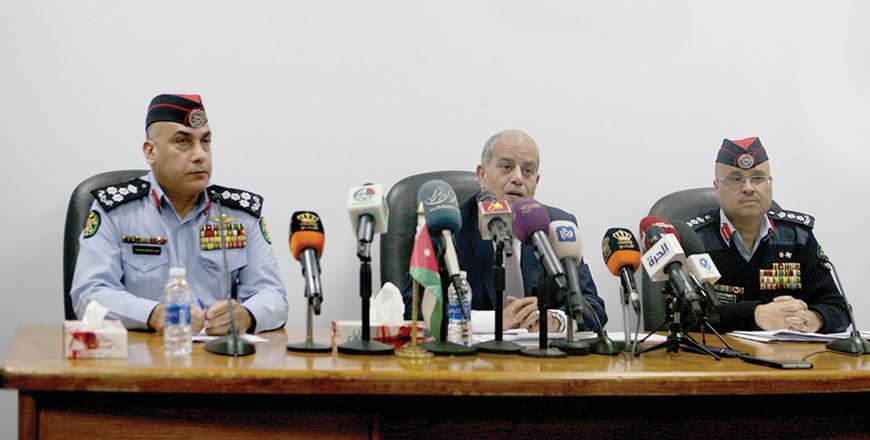You are here
‘Some individual cases of torture not reflective of entire system’
By JT - Nov 29,2018 - Last updated at Nov 29,2018

In this photo taken on Wednesday, Basil Tarawneh (centre) defends the Public Security Department’s efforts to abide by legal procedures governing the handling of detainees (Petra photo)
AMMAN — Some individual cases of torture cannot be elevated to the status of "systematic approach" by the state and it is unfair to make a generalisation out of them, Government Coordinator for Human Rights Basil Tarawneh said on Wednesday.
Tarawneh told a press conference on Wednesday that the government is keen on combating all forms of torture and inhuman and degrading treatments, the Jordan News Agency, Petra, reported.
The presser came two days after the Adaleh Centre for Human Rights Studies released a report, claiming that several detainees had died of torture while in the custody of Jordanian authorities. The centre said it documented signs of severe beatings and the use of traditional torture.
The report cited several relatives of detainees who allegedly died under torture, saying they had seen the bodies of their deceased bearing clear marks of abuse and violence, not to mention arrests made “without sufficient evidence” by the Public Security Department (PSD).
Tarawneh said that the PSD has been playing a "leading regional role" in spreading human rights principles, adding that the department has offered specialised training to police personnel from the Arab world on human rights, according to Petra.
In response to Adaleh’s report, PSD said that there were specialised units tasked with ensuring that police personnel abide by the legal measures pertaining to handling detainees during an investigation.
The PSD added that the department was surprised with remarks by lawyer Asem Rababaah, quoted in Adaleh’s report as saying that “torture in Jordan is systematic”.
The department said that such organisations never highlight the “sacrifice” of police personnel and other security agencies in safeguarding the security and stability of the Kingdom.
Underlining that the government has put in place "strict" anti-torture measures, Tarawneh said that "no agency should make any conclusions without listening to concerned institutions' accounts and before the issuance of relevant court rulings".
The coordinator also said that all relevant Jordanian laws are in line with the Convention against Torture and Other Cruel, Inhuman or Degrading Treatment or Punishment, commonly known as the United Nations Convention against Torture.
He also said that a total of 46 inhuman and degrading treatment cases were recorded in 2017 which resulted in the conviction of 114 persons and there are five cases of torture are being looked into by the Police Court.
As per the government's efforts to inform the public about related procedures, Tarawneh also said that the PSD arranges regular visits for civil society organisations, including the International Committee of the Red Cross, to rehabilitation centres.
To ensure that inmates receive human and decent treatment, Tarawneh said that the government has started rehabilitating detention centres to ensure their compatibility with international and national human rights criteria, Petra reported.
Related Articles
AMMAN — Evidence of torture and abuse indicates that several detainees had died while in custody of Jordanian authorities, allegedly under i
AMMAN — Deemed a crime against human dignity and a grave violation of human right principles, torture must become a socially rejected practi
AMMAN — A report that documented cases of alleged torture and cruel treatment by law enforcement officers against detainees and prisoners ca

















